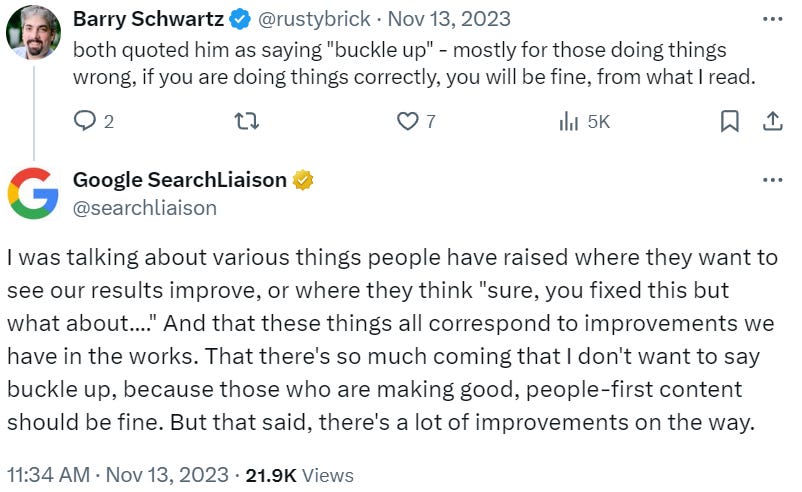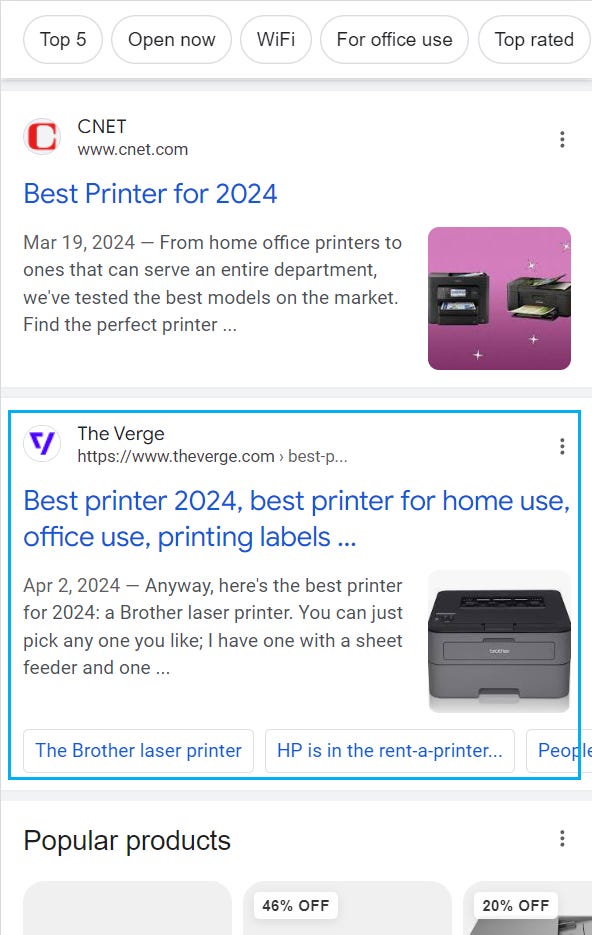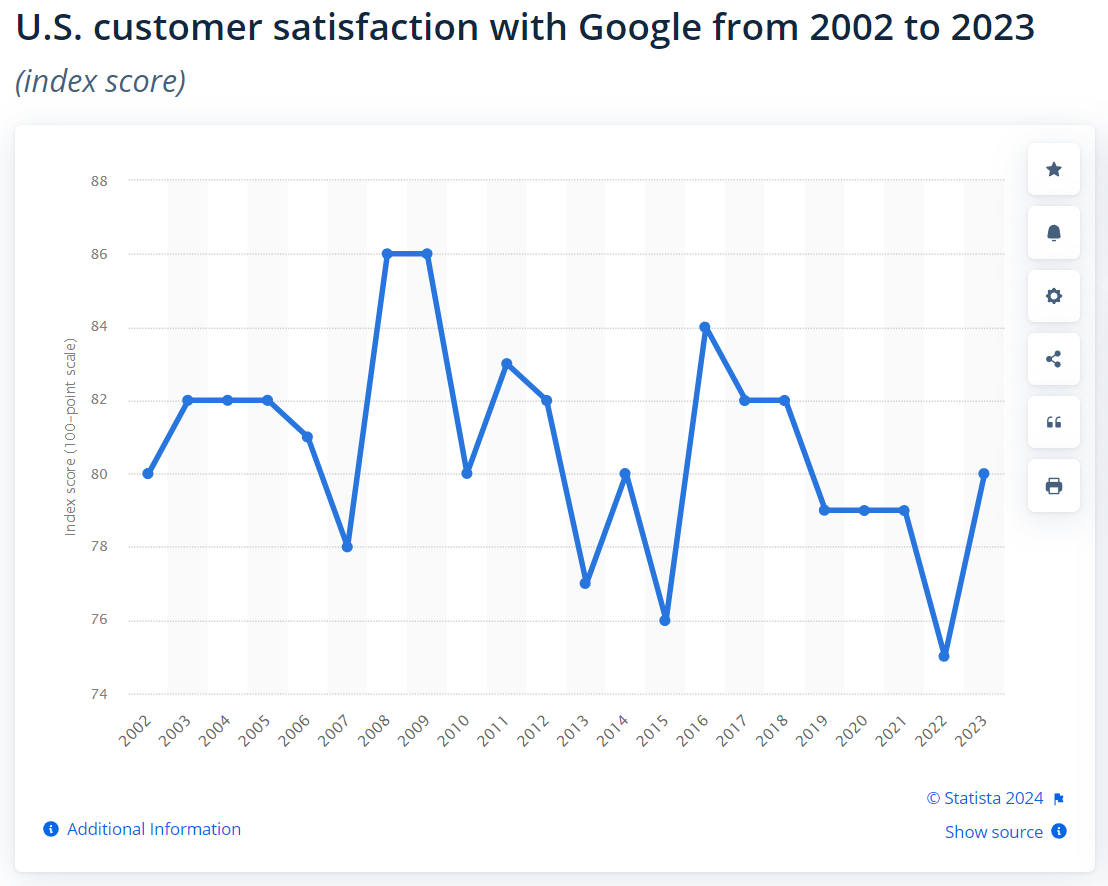SEO Twitter reacted strongly when I shared Sundar Pichai’s statements about Search Generative Experience (SGE) from Alphabet’s Q1 earnings call (bolding mine):
“Based on our testing, we are encouraged that we are seeing an increase in search usage among people who use the new AI overviews as well as increased user satisfaction with the results.”
“People question whether these things would be costly to serve, and we are very, very confident we can manage the cost of how to serve these queries. People worried about latency. When I look at the progress we have made in latency and efficiency, we feel comfortable.”
“There are questions about monetization. And based on our testing so far, I’m comfortable and confident that we’ll be able to manage the monetization transition here well as well.”
I get it. Our perception of SGE doesn’t match the CEO of Alphabet suggesting that SGE is ready for prime time. There are only two options: We live in a bubble or it’s PR talk.
The book, “The Facebook Effect: The inside story of the company that is connecting the world,” has a story about how users complained about Facebook’s newsfeed but heavily engaged with it anyway. The public perception was the complete opposite of what eventually happened. There is a real chance the same phenomenon is happening with SGE.
Life taught me that outraging things are often not the way they seem at first. Surprises bear learnings. I’m naturally quick to judge situations and people, but I’m always happy when I pause and take a closer, second look. This could be one of those situations.
Maybe Sundar knows more than we do. If that’s true and users actually enjoy SGE, we, in the SEO community, have a larger disconnect with the average Google user than we might think.
However, there is also a real chance that Pichai’s comments are PR based on Google’s trust-eroding misses over the last 24 months.
Boost your skills with Growth Memo’s weekly expert insights. Subscribe for free!
Friction
Google’s position and public perception are head-butting in several departments:
Lawsuits
The Department of Justice’s 2020 antitrust lawsuit against Google surfaced documents that prove the heavy use of user signals for ranking, which Google vehemently denied for decades.
Another lawsuit filed the same year about Google tracking user data in Chrome’s incognito mode just settled with Google deleting billions of data points, improving its disclosure and stopping to track when users switch to incognito mode.
From Elephant in the Room:
For years, SEOs suspected user behavior to matter for Google’s Search ranking systems, but Googlers either denied or belittled the point. Internal documents that surfaced in the 2020 US vs. Google anti-trust lawsuit prove the elephant’s existence.
We now have track records, footprints, and photos of the elephant. The house owner doesn’t need to acknowledge it exists. But the biggest takeaway is that we had our mental model of how Search works upside down.
AI Fumbles
Then, there are fumbled AI product launches.
Google’s first reaction to ChatGPT’s stunning success was a stunning failure. The introduction of Bard in February 2023 cost Alphabet $100 billion in market value due to false facts in the announcement.1
In December 2023, an impressive demo of Gemini turned into a PR disaster when it turned out to be fake.2
In March 2024, Alphabet’s shares dropped by -5% when it turned out Gemini delivered heavily biased and obscure historical images.3
Google wants to get AI right so badly that it’s willing to cut corners. It’s not something you’d expect from the company that invented the underlying LLM technology (Transformers) in the first place.
Algorithm Updates
Then, there is communication around algorithm updates. First called out by The Verge, Google’s SEO documentation is quite broad for how search evolved:4
There’s an inherent contradiction in what Google promises is the best way to succeed on Search. Publicly, Google representatives like search liaison Danny Sullivan give a simple, almost quaint answer to business owners who want help: you just need to make great content for people, not Google’s robots.
At the same time, Google’s SEO Starter Guide is nearly 9,000 words long with dozens of links to additional material.
To be fair, I do appreciate the work Danny Sullivan, Martin Splitt, John Mueller, Gary Illyes, and others do. I know it’s a tough and thankless job. You can’t really win.
I also acknowledge that The Verge is not a big fan of SEOs, a.k.a. Content Goblins. And yet, there is something to be said about the critique of the SEO guidelines.
We’re also experiencing a growing disconnect between what we hear from Google spokespeople and what we see.
In November, Sullivan came to Brighton SEO San Diego and announced to “buckle up” because “major changes to search ranking” are coming. 5
 Image Credit: Kevin Indig
Image Credit: Kevin IndigWe had the longest Core Update ever in March 2024, with a 45-day roll-out time that apparently overshot its goal of reducing low-quality results by 5 percentage points. But the effect is barely noticeable.
Google also said this helped reduce low-quality and unoriginal content in search results by 45%, which is up from their estimate of 40%.6
What stung was that Google’s official X (Twitter) account announced the completion of the update 7 days late.7
Now, you could argue that Google can do whatever it wants and has no obligation to notify SEOs (timely). And that’s correct.
But a couple of years ago, that wouldn’t have happened – especially since Google’s updates have become more hardcore, and owners of negatively affected sites desperately wait for updates.
It seems the transparency between Google and the SEO community has changed.
Public Complaints
Then, we have the (not new) critique of big domains dominating search results.
The Verge published an article about the “best printer” that’s clearly optimized with old-school SEO techniques. But it works and proves that big sites get away with much more than small ones.
 Image Credit: Kevin Indig
Image Credit: Kevin IndigIn the last 12 months, we’ve seen more complaints from marketers and owners of small sites like Housefresh and Retro Dodo for being on the brink of death because of Google.8 9
To be fair, it’s difficult to say whether Google truly prefers big brands or whether users do, and if small publishers are missing something important that matters for SEO.
But brands publishing blog articles about how Google is killing them is new and doesn’t help with Google’s image.
Church And State
Lastly, the separation between church and state seems to fall.
Google now allows ads to appear below the top organic results for specific queries, which would have been unthinkable even five years ago.10
It doesn’t help that internal emails surfaced in the DOJ lawsuit, showing how Google’s ads team put significant pressure on the organic search team to make changes that would result in more searches.11
We don’t know whether that happened or not, but it doesn’t look great. Neither does the testimony that Google raised cost-per-click (CPC) prices.12
Journalist Ed Zitron recently published a story titled “The Man Who Killed Google Search” on his blog that went viral.13 It’s an extreme take, but it resonates so strongly because of the long list of Google’s misses over the last years paired with record-breaking earnings.
Unbiased Referee
On top of it all comes the growing disconnect between our subjective perception of search quality and Google’s statements (also subjective).
Jeff Bezos wrote, “Customers are always beautifully, wonderfully dissatisfied…” in his 2016 annual shareholder letter.
It’s possible that we all have gotten used to search and are baseline dissatisfied. But it’s also possible that search has become worse, and we just lack an objective way to measure it.
We only have a few data points:
1. A study from Germany titled “Is Google getting worse?”14 finds:
- “An overall downwards trend in text quality in all three search engines” despite Google’s regular updates targeting low-quality content, which has only a short-lived impact.
- “Higher-ranked pages are on average more optimized, more monetized with affiliate marketing, and they show signs of lower text quality.”
2. A Google satisfaction score based on a survey (n=~8,000) shows a downward trend.15
 Image Credit: Kevin Indig
Image Credit: Kevin Indig3. A Semrush zero-click study from 2022 found more than half of users refine their queries, indicating potential dissatisfaction with results.16
We can see that about 55% of the times two searches are performed in a user’s journey contain keywords with a similarity rating of 0.6 (60%) or more, which could mean that many users aren’t satisfied with the results of the first SERP and need to refine their queries.
We need an unbiased referee on the field. But it’s unlikely we’ll get one.
Way Forward
The disconnect with Google leads us to three conclusions:
- Guidance around algorithm updates and data about what’s going on in search is unlikely to become more specific.
- The search results landscape and how it changes is increasingly complex.
- Businesses that rely on organic traffic for survival have a high risk.
We, as SEOs, made two mistakes: saying organic traffic is reliably sustainable and free.
I remember one of the big arguments for SEO that sounded like this: “When you turn ads off, you don’t get any more traffic. When you turn SEO off, traffic keeps coming in.” I’ve used it, too.
But the quickly changing search landscape plus Google’s intransparency make SEO a volatile channel that can bring traffic to our site but doesn’t guarantee that well to keep pouring water.
Rather, we should think about how to bring organic visitors to channels where we can build deeper relationships with our audience.
One way to build closer relationships is to incentivize users to sign up for our email list, download our app(s), and create log-ins.
Then, we need to answer the question of how to nurture them by building trust over time with exclusive, high-quality, and personalized content. What is the second-click experience on your site?
Today, SEO is anything but free. It has much lower variable costs compared to advertising, but fixed costs nonetheless. Those fixed costs have skyrocketed since the bar for high-quality content is so much higher than we think.
Driving traffic takes original research, graphic assets, high-quality writing, and experts who need to be paid.
Tighter SEO unit economics can manage expectations and alleviate volatility because bigger investments lead to higher chances of thriving in search.
We might be disconnected from Google, but we can still connect with our audience.
1 Google CEO Calls Some Gemini AI Output ‘Completely Unacceptable’
2 Google’s best Gemini demo was faked
3 Google’s AI blunder shows risks in scramble to catch up to Microsoft
5 X (Twitter) post by Google SearchLiaison, November 14, 2023
6 Google March 2024 Core Update Finished
7 X (Twitter) post by Google Search Central, April 27, 2024
8 Google Is Killing Retro Dodo & Other Independent Sites
9 How Google is killing independent sites like ours
10 Google Updates Definition Of ‘Top Ads’ In Search Results
11 Emails Show Google Search & Ad Execs Working Together To Increase Ad Revenue
12 Google quietly raised ad prices to boost search revenue, says executive
13 The Man Who Killed Google Search
14 Is Google Getting Worse? A Longitudinal Investigation of SEO Spam in Search Engines
15 U.S. customer satisfaction with Google from 2002 to 2023
Featured Image: Paulo Bobita/Search Engine Journal





